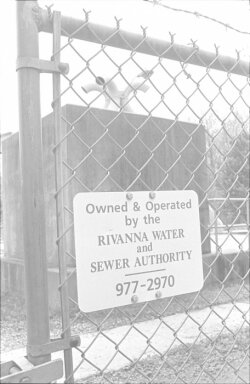Woolen Mills stinks
Here’s a realtor’s listing you won’t see: charming, historic house on Rivanna River with easy access to sewage pumping station. Hold your nose when you make an offer in this delightful neighborhood.
Residents in Woolen Mills are tired of holding their noses. On April 18, about 30 members of the neighborhood met with Rivanna Water and Sewer Authority management to vent their frustrations.
“It smells a lot, and it smells often,” says neighborhood association president Jon Fink.
Authority executive director Larry Tropea, who took on the job last October, didn’t seem to be aware that he was walking into a cesspool of complaints when he came to the meeting. In fact, his admission that the smells were news to him had attendees murmuring— especially those who’ve been complaining about the Rivanna pump station since it was built in 1980.
Authority water and sewer director Gene Potter wasn’t able to plead ignorance. He’d spoken with a number of residents in the past, and he didn’t mince words in his response to one caller’s request that the pump station be removed: “It ain’t gonna happen, folks.”
Residents complained about the aesthetics of the pump station: one woman wanted it painted green to blend in with the trees. But aesthetics are the easy part of pacifying the neighborhood, Potter acknowledged.
The root problem? In Potter's words: “waste water stinks.” The swirling, foaming pools of human waste at the Moore’s Creek Wastewater Treatment Plant must have something to do with the stench, but Potter says he's convinced that site compost yard is at least equally to blame.
When asked whether there was data available to differentiate the odors, Potter retorted that his nose was highly trained. “I don’t need empirical data to tell the difference,” he sniffed.
Potter described the efforts RWSA has made over the years to address the odor problem as “starting at the bottom of the apple tree” in looking at the cheapest solutions first.
Residents made clear they were ready for the Authority to get to the top of the tree. Potter estimated that two and a half to three years would be a realistic expectation for something to be done.
“I don’t want Rich Collins let off the hook so easily,” said Peggy Van Yahres about the Authority chairman, who was sitting in a back row at the meeting at Woolen Mills Chapel. Collins advised the residents to meet with the Authority’s staff and to lobby City Council, which, along with the Albemarle Board of Supervisors, funds the Authority.
After Tropea said he didn’t know the stench was a problem, Woolen Mills residents got even testier. Gillian Kyles, for instance, asked whether the Authority’s complaint log was shared with its board. Another woman asked how “this gentleman”— Potter— could be the neighborhood’s advocate when he’d never notified the Authority board that the odor was a problem.
“I promised Gene he wouldn’t be attacked if he attended,” Van Yahres hastily interjected.
When a nurse asked about health problems from breathing sewer gas, Tropea replied that it’s the same air Authority employees breathe.
Preston Coiner had to bat down interruptions several times when he asked whether the bio-filter put on the station works and whether more frequent maintenance on the bio-filter would help.
Fink ended the pump station portion of the neighborhood meeting about the time Potter asked sustainable architect Christopher Hays— who, along with Allison Ewing, built a fancy new house across the street from the station— why Hays bought property there, knowing its malodorous history.
Tropea requested a three-member committee from the neighborhood to work with authority staff, and Fink emphasized how significant it was that bigwigs from the Authority had attended the neighborhood meeting.
(Indeed, at the April 22 RWSA budget hearing, Tropea committed $20,000 slated for beautification of the Authority’s administration building to a feasibility study to improve the pump station.)
Outside the Woolen Mills Chapel, the night air was ripe. “Here’s our neighborhood smell,” said one resident.
“I only wish I knew in advance when this was going to happen before I invite people over for dinner,” groused another.
